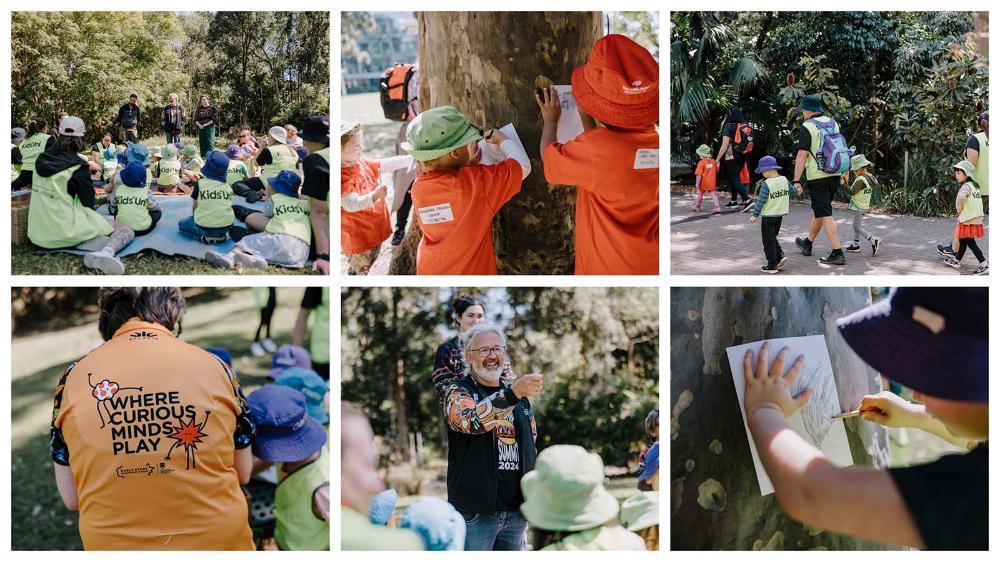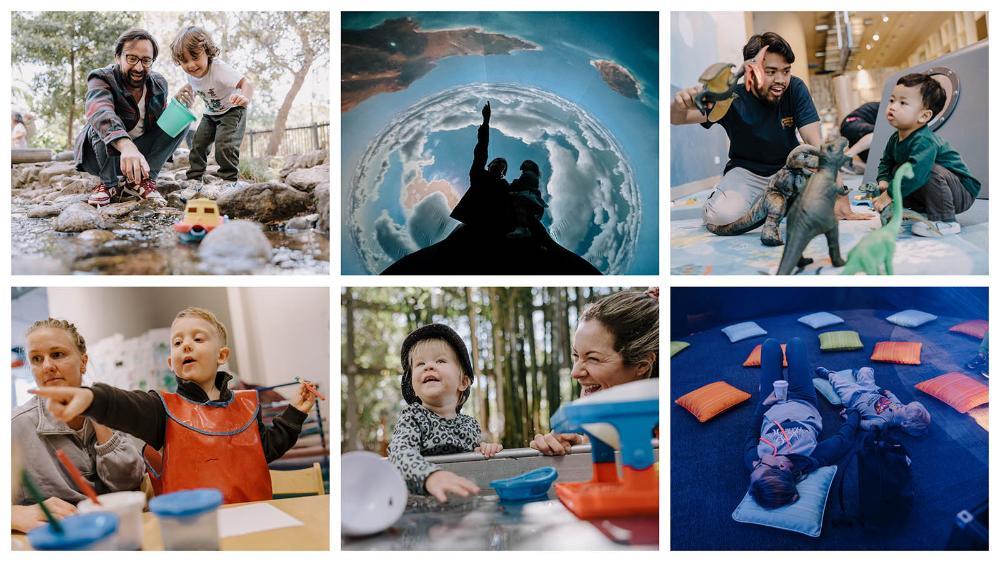September 5, 2024
Early Start celebrates Indigenous Literacy Day
Children explore the significance of Country: learning how to read Country, art experiences and CABAH planetarium show
The University of ÌìÃÀ´«Ã½app (ÌìÃÀ´«Ã½app) yesterday (Wednesday 4 September) hosted several events at Early Start, including in the , offering children the chance to engage in a range of activities that explored the importance of Country to celebrate
Indigenous Literacy Day is an annual celebration of Aboriginal and Torres Strait Islander Peoples’ stories, cultures and languages. The invests in Aboriginal and Torres Strait Islander remote communities to provide the tools and resources they request to shape the direction of their children’s literacy future.
This year, Early Start celebrated the theme ‘Be A Proud Voice for Country’ by exploring some of the ways children, Elders and families connect with Country and the significance of Country in Aboriginal Communities.
Children from Cullunghutti Early Learning Centre, Noogaleek Children’s Centre, Winnanggay Preschool and Kids Uni joined ÌìÃÀ´«Ã½app academics and on a guided walk on Country.
Peter Hewitt, Senior Lecturer of Aboriginal Education in the School of Education and Dr Anthony McKnight, Senior Lecturer and Curriculum Transformation Lead in the Indigenous Strategy Unit invited the group of preschool-aged children and their educators to observe Country during the walk around the ÌìÃÀ´«Ã½app Campus.
They taught the group how to read Country by sharing Aboriginal Knowledge that has been taught to them from Country, Elders and teachers from the community.
“It is important that we read the text of the land, especially given it is Indigenous Literacy Day. We need to look, listen and see Country,” Mr Hewitt said.
“A walk on Country is an opportunity to slow down a bit. It is about reiterating that literacy of tuning in to feel the wind, or that simple act of giving gratitude to Grandfather Sun.”

Active listening and learning were encouraged during the walk, with participants learning how to read Country the same way they would read a written book.
“There's a literacy here that we need to foster and nurture with our kids. It is a good little reminder for the teachers as well, because that is what we have been taught to do,” Dr McKnight said.
“There's plenty of chapters in the landscape. By introducing them to it we are bringing them to understand their ABC’s.
“Asking the question, ‘what books are there? What chapters are there? What paragraphs are there?’
“Being aware that these things communicate – the creek, the trees, the birds – we can then introduce the children to them. These are the vowels and the nouns. All the basics of how to read.”
The group were encouraged to focus on the power of children’s voices when thinking about the ways we can listen to and care for Country.
“We need to validate what children are picking up from that communication of Country. They are giving voice to Country in their own little way,” Mr Hewitt said.
“We have an oral culture. By hearing children have their playful yarns, responding to a question or realising that sometimes their silence is just as loud as the words that they use, is them tuning into Country.”
“It is the child spirit. It is valuing the child spirit that we all have within us. It is a nice reminder to remember our own child spirit and embrace that enthusiasm for life,” Dr McKnight said.

Activities open to the public were held throughout the day at the Early Start Discovery Space, including CreARTivity art sessions inspired by the story ‘Our Island’ by Children of Gununa, Alison Lester and Elizabeth Honey. Children and their adults were given the opportunity to explore the technique of using wax resist with watercolour washes to personally reflect on ways to care for Country.
In The Pod, visitors were invited to join screenings of the feature-length full-dome planetarium show, . The show is a project from the Australian Research Council Centre of Excellence for Australian Biodiversity and Heritage (CABAH) produced by the in collaboration with First Nations communities and .
Visitors were able to join a livestream with the Indigenous Literacy Foundation, live from the Sydney Opera House, where a 15-minute film featuring three First Nations Communities across Australia to learn about their unique stories, languages, and cultures.
In support of the Indigenous Literacy Foundation, Early Start also hosted the . Visitors were able to take home a donated book for a small donation. The funds raised help provide books in first languages and learning resources to children and families in remote Communities across Australia.
Josef English, Manager of Early Start Operations said Indigenous Literacy Day was an important opportunity to explore First Nations Knowledges.
“Through creating play-based learning experiences, children, their adults and our community explored what caring for Country means to them,” Mr English said.
“Indigenous Literacy Day serves as a reminder of the importance and our commitment to fostering understanding of Indigenous stories, languages, and cultures.”
